📝 Note: This article was last updated on February 18, 2025. We regularly update the information to ensure you have the latest insights! 😊
Continuing our GitHub Star series! This is the fourth article in the series. Previous articles include:
- The Top 12 Open-Source No-Code Tools with the Most GitHub Stars
- Top 15 Open-Source Low-Code Projects with the Most GitHub Stars
- Top 11 Open Source Internal Tools with the Most GitHub Stars
Now let’s review CRUD projects. In software development, CRUD (Create, Read, Update, Delete) is fundamental data operations that form the core of most applications’ interactions with data.
(If you are not familiar with this concept, we recommend reading: How to Build Efficient CRUD Apps?)
In today’s article, I’ll introduce these CRUD projects on GitHub, focusing on their popularity and functionality to help you understand how various projects can enhance software development efficiency!
First, let’s take a quick look at the rankings:
| Rank | Project | Stars |
|---|---|---|
| 1 | Appsmith | 35.7k |
| 2 | Refine | 29.9k |
| 3 | APIJSON | 17.4k |
| 4 | NocoBase | 13.5k |
| 5 | Library (DDD by Examples) | 5.1k |
| 6 | Flask-AppBuilder | 4.8k |
| 7 | CRUD (Nestjsx) | 4.1k |
| 8 | PHP-CRUD-API | 3.6k |
Let’s get started!

Appsmith (35.7k stars)
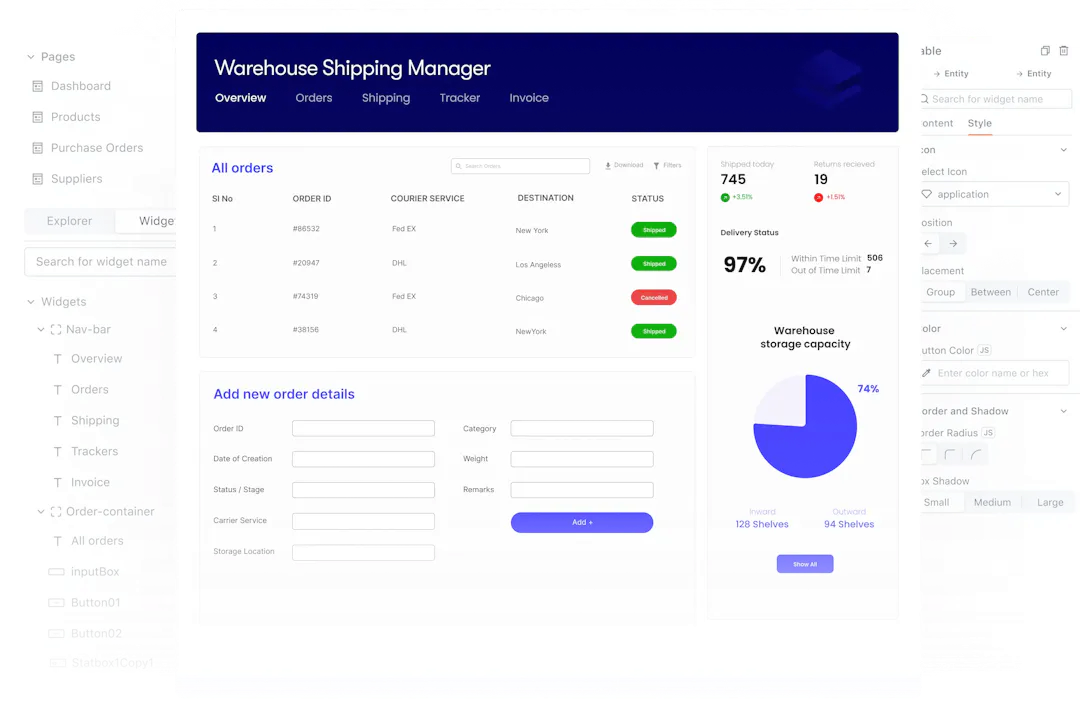
| GitHub | https://github.com/appsmithorg/appsmith |
|---|---|
| GitHub Stars | 35.7k |
| Most Recent Update on GitHub | Within one day |
| Open Source License | Apache 2.0 |
| Number of Active Contributors | 334 |
| Acceptance of External PRs | Yes |
| Official Website | https://www.appsmith.com/ |
| Documentation | https://docs.appsmith.com/ |
Appsmith is an open-source platform designed for building admin panels, internal tools, and dashboards. It integrates with over 25 databases and various APIs, enabling rapid application development from data sources to the front end.
💡 Read More: NocoBase vs. Appsmith: Which Open Source Low-Code Platform is Right for You?
Key Features
- Rapid CRUD Generation: Appsmith can automatically generate CRUD interfaces for any database with simple clicks, significantly simplifying database application development.
- Flexible Front-End Customization: Provides a rich component library with drag-and-drop functionality, allowing users to customize application interfaces without front-end development skills.
- JavaScript Extensions: Users can write JavaScript in component properties for more complex feature customization and dynamic data updates.
Use Cases
- Internal Tools Development: Quickly develop various management tools needed within enterprises, such as data management panels and customer support dashboards.
- Agile Data Management Applications: For business scenarios requiring frequent data updates, Appsmith offers quick response and easy-to-manage solutions.
💡 Read More: Top 11 Open Source Internal Tools with the Most GitHub Stars
Refine (29.9k stars)
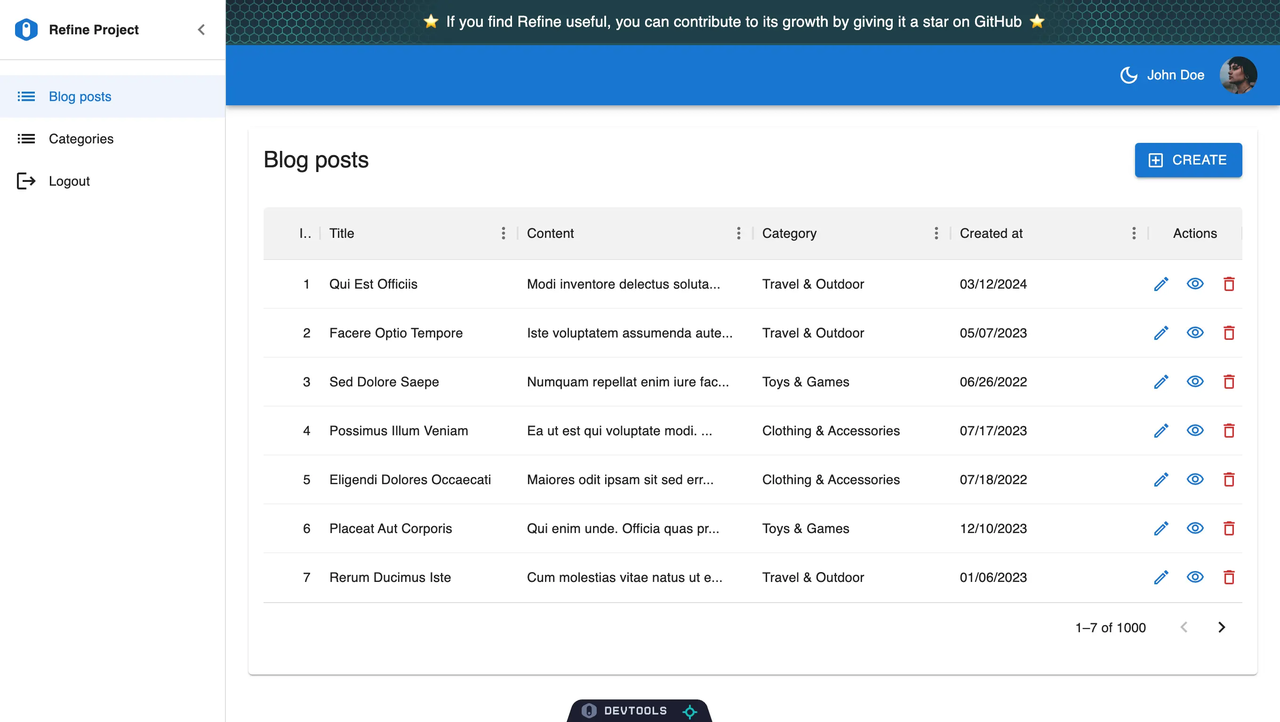
| GitHub | https://github.com/refinedev/refine |
|---|---|
| GitHub Stars | 29.9k |
| Most Recent Update on GitHub | Within one day |
| Open Source License | MIT |
| Number of Active Contributors | 284 |
| Acceptance of External PRs | Yes |
| Official Website | https://refine.dev/ |
| Documentation | https://refine.dev/docs/ |
Refine is a React-based meta-framework designed for CRUD-heavy web applications. It is suitable for various use cases, including internal tools, management panels, dashboards, and B2B applications. Refine offers headless architecture support, allowing developers to decouple business logic from user interface and routing for highly customizable applications.
💡 Read More: Top 6 Core App Dashboard Building Tools
Key Features
- Headless Architecture: Refine’s headless architecture supports integration with various custom designs or UI frameworks (such as Ant Design and Material UI), and is compatible with multiple platforms (such as Next.js and React Native), providing flexible routing interfaces without extra setup.
- Rapid Development: Offers a range of core hooks and components, simplifying the project development process, including authentication, access control, routing, and state management.
- Customizability and Extensibility: Supports a wide range of backend service connectors, including REST and GraphQL APIs, and native support for various databases, allowing developers to choose the appropriate tech stack.
Use Cases
- Enterprise Internal Tools: Build management panels and tools for enterprise use, simplifying data management and business processes.
- Data-Intensive Applications: Particularly suited for enterprise B2B applications that handle large amounts of data, such as CRM systems and e-commerce backends.
- Custom Enterprise Applications: Refine allows for flexible configuration and extension, enabling enterprises to tailor applications to specific needs for better business operation support.
💡 Read More: Build CRM in Hours: Top No-Code/Low-Code Tools You Need to Know
APIJSON (17.4k stars)
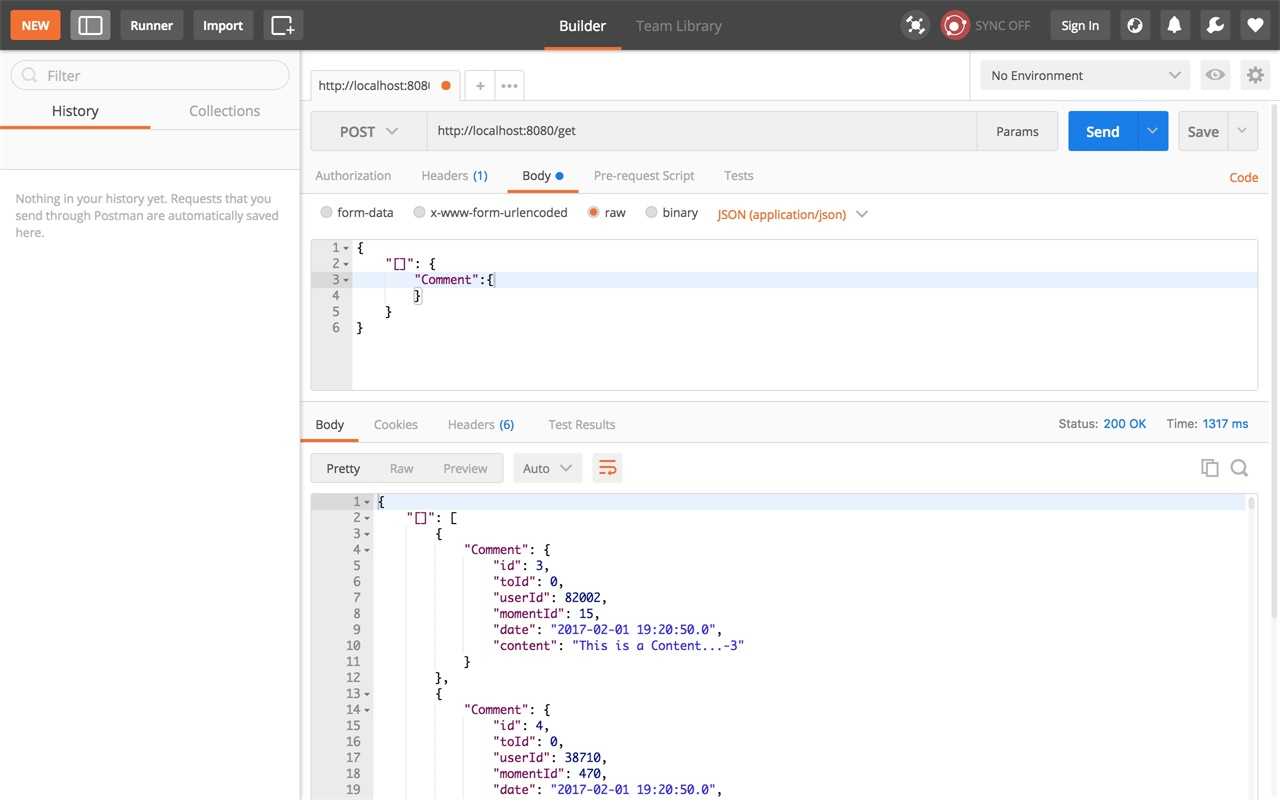
| GitHub | https://github.com/Tencent/APIJSON |
|---|---|
| GitHub Stars | 17.4k |
| Most Recent Update on GitHub | 3 days ago |
| Open Source License | Apache 2.0 |
| Number of Active Contributors | 72 |
| Acceptance of External PRs | Yes |
| Official Website | http://apijson.cn/ |
| Documentation | https://apijsondocs.readthedocs.io/en/latest/ |
APIJSON is a JSON-based communication protocol and ORM library designed for APIs. It allows developers to automatically generate backend interfaces and front-end request code by defining JSON objects rather than writing backend code. APIJSON is particularly suitable for scenarios requiring rapid API development, reducing communication overhead and API documentation work, thus significantly lowering development costs.
Key Features
- Automated CRUD Operations: APIJSON provides powerful CRUD functions supporting complex queries via simple JSON configuration, including join queries and complex filtering conditions.
- Security and Flexibility: Built-in automatic permission validation and SQL injection protection mechanisms ensure API security. APIJSON also supports version management, so API iterations do not affect existing systems.
- Efficient Data Handling: Supports fetching multiple resources and data forms in a single request, reducing the need for multiple requests and optimizing data interaction efficiency.
Use Cases
- Rapid Development: Suitable for startups and SMEs needing to quickly build prototypes and develop applications, especially when projects require rapid iteration and frequent API changes.
- Internal Tools: Quickly set up backend management interfaces for enterprise management systems and monitoring systems.
- Education and Learning: Due to its ease of use, APIJSON is also suitable for educational environments to help students and beginners understand API construction and usage.
NocoBase (13.5k stars)
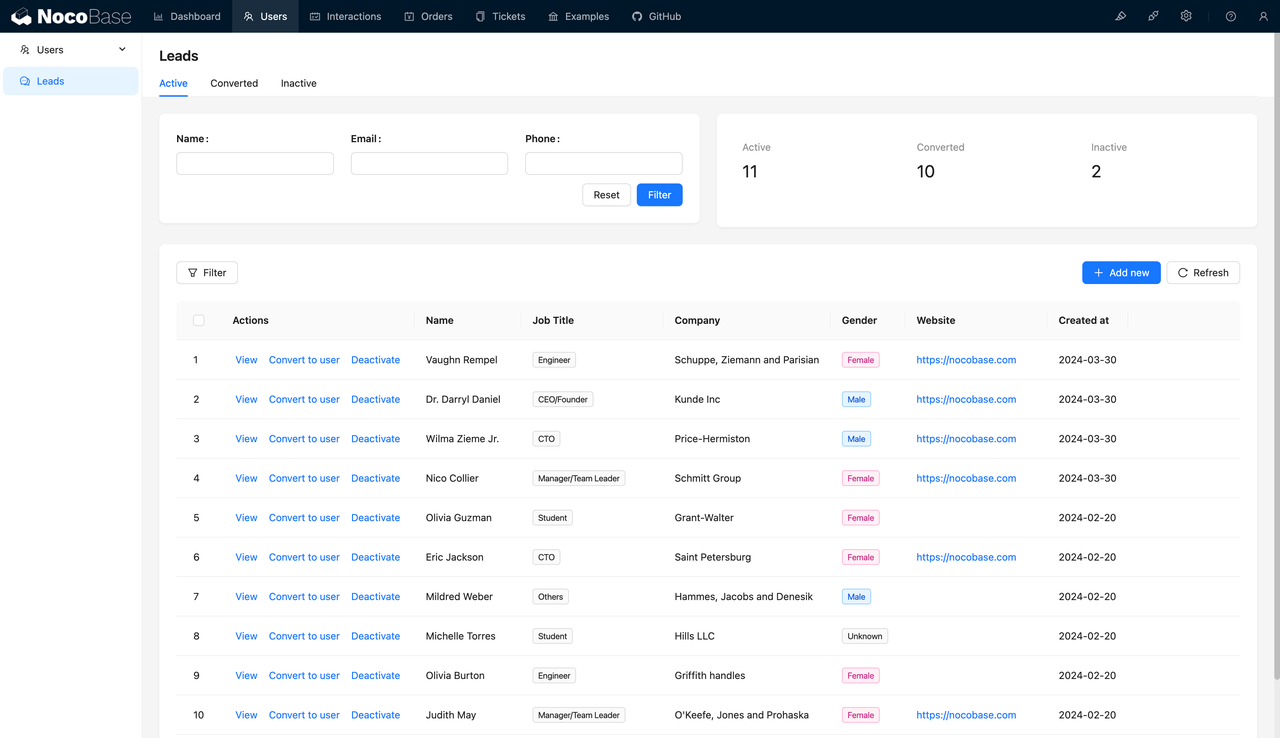
| GitHub | https://github.com/nocobase/nocobase |
|---|---|
| GitHub Stars | 13.5k |
| Most Recent Update on GitHub | Within one day |
| Open Source License | AGPL-3.0 |
| Number of Active Contributors | 85 |
| Acceptance of External PRs | Yes |
| Official Website | https://www.nocobase.com/ |
| Documentation | https://docs.nocobase.com/ |
NocoBase is a highly extensible open-source no-code/low-code platform designed for enterprise-grade business applications and solutions. From a CRUD perspective, NocoBase offers a robust data model-driven approach, making it ideal for building and managing complex data interactions. Through NocoBase, enterprises can quickly deploy applications with complex data processing capabilities without deep backend development, greatly improving development efficiency and system scalability.
🙌 Have a try: NocoBase Tutorial – Task Management System
Key Features
- Flexible Data Modeling: Allows users to define detailed data models, including various attributes and relationships, directly mapped to the database structure, supporting highly customizable CRUD operations.
- Dynamic Data Interaction: Users can configure and manage CRUD operations directly on the front end through a WYSIWYG interface, eliminating the need for backend code. This includes adding, editing, deleting, and viewing data records.
- Automation and Plugin Support: NocoBase’s plugin architecture supports automation workflows such as form validation, data processing, and view updates, further simplifying the CRUD process.
Use Cases
- Internal Management Systems: Build internal CRM, project management systems, etc., supporting complex data management and process automation.
- Enterprise Applications: Suitable for enterprise applications requiring frequent data operations, such as customer data management, inventory tracking, and order processing.
- Rapid Prototyping: Quickly validate business ideas and models, especially suitable for startup environments needing rapid iteration and development.
Library (5.1k stars)
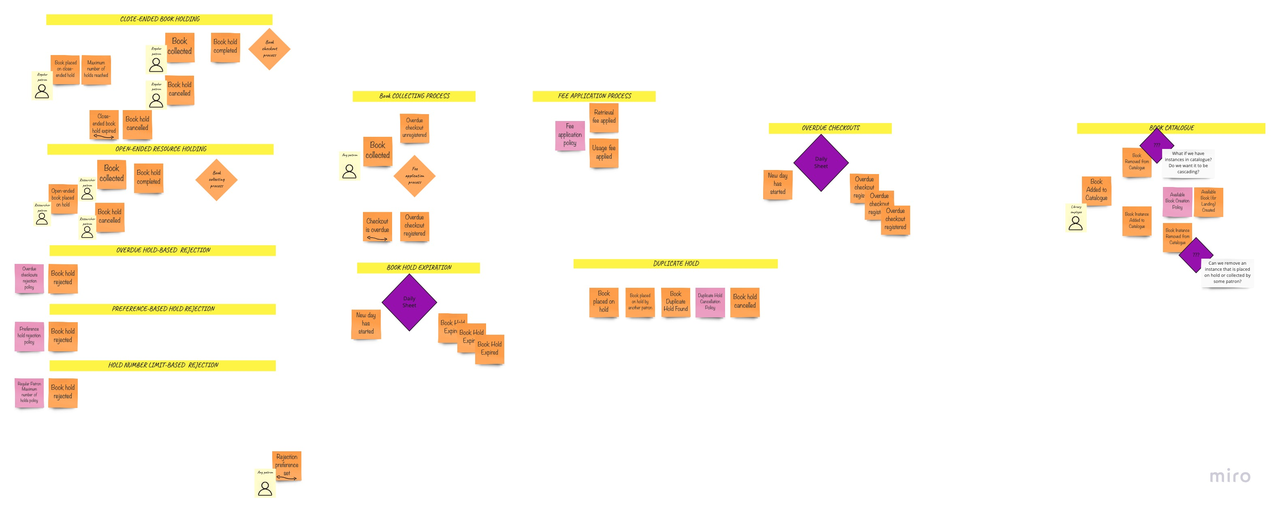
| GitHub | https://github.com/ddd-by-examples/library |
|---|---|
| GitHub Stars | 5.1k |
| Most Recent Update on GitHub | 2 years ago |
| Open Source License | MIT |
| Number of Active Contributors | 17 |
| Acceptance of External PRs | Yes |
| Official Website | / |
| Documentation | / |
Library is a practical example aimed at helping people understand how to apply Domain-Driven Design (DDD) in the real world. Library focuses on a library management system, similar to what public libraries use to manage books, readers, borrowing, and returns.
The project uses a modular monolithic architecture, with each bounded context allocated to a separate package, demonstrating complex business processes through rich domain logic and CRUD operations. This project not only shows how to build complex business logic but also bridges the gap between theory and practice with real code.
Key Features
- Rich Domain Model: The Library project uses a domain model to handle complex business logic, such as the book borrowing process, utilizing a hexagonal architecture to separate domain and application logic.
- Flexible CRUD Application: For book catalog management, the project applies CRUD architecture to handle relatively simple domain logic.
- Event-Driven Consistency: Library uses events to manage communication between aggregates, supporting immediate and eventual consistency options, demonstrating how to achieve these functions via domain event interfaces.
Use Cases
- Library Management Systems: Manage processes such as book borrowing, returns, and reservations, suitable for systems dealing with complex business logic and rules.
- Education and Research: As a DDD implementation example, suitable for academic research and educational training, helping understand the details and challenges of domain-driven design in practical applications.
- Software Architecture Design: Provides practical architecture design experience for software developers, especially in using DDD and event-driven architecture.
Flask-AppBuilder (4.8k stars)
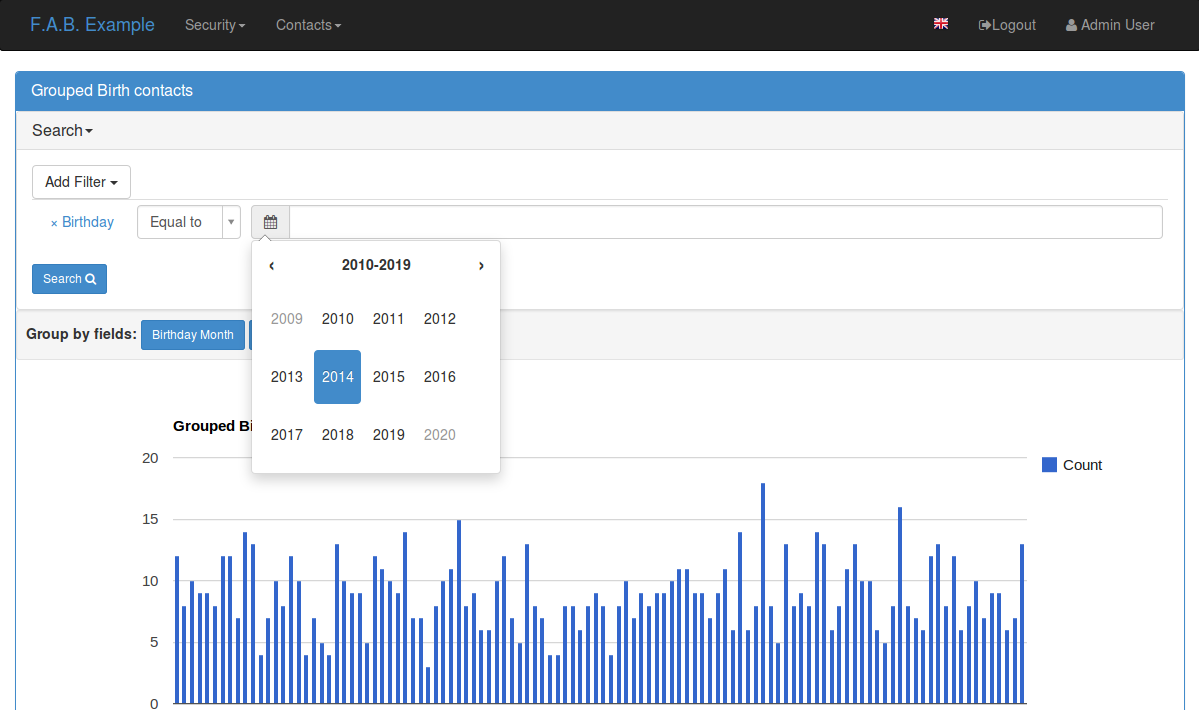
| GitHub | https://github.com/dpgaspar/Flask-AppBuilder |
|---|---|
| GitHub Stars | 4.8k |
| Most Recent Update on GitHub | 2 weeks ago |
| Open Source License | BSD-3-Clause |
| Number of Active Contributors | 192 |
| Acceptance of External PRs | Yes |
| Official Website | / |
| Documentation | https://flask-appbuilder.readthedocs.io/en/latest/ |
Flask-AppBuilder is a rapid application development framework based on Flask, with a special focus on security and automated CRUD operations. This framework simplifies backend development processes, allowing users to quickly generate complete CRUD interfaces from data models, significantly accelerating development speed and reducing complexity.
Key Features
- Automatic CRUD Generation: Flask-AppBuilder can automatically generate CRUD pages and interfaces for your data models, including forms and views, simplifying the database operation development process.
- Security and Authentication: Provides fine-grained security configurations, supporting various authentication methods such as database, LDAP, OAuth, etc., and automatically handles permissions and role management.
- Flexible Interface and Components: Supports various views and components, such as charts, filters, date pickers, and data visualization features based on Google Charts.
Use Cases
- Enterprise Internal Systems: Suitable for quickly developing enterprise internal management systems, such as HR, inventory, and finance systems.
- Data Management Applications: Provides robust backend management functionality for applications requiring complex data operations, such as content management systems or CRM systems.
- Education and Training: Due to its simplicity and ease of learning, it is ideal for teaching purposes, helping learners quickly understand web development and database operations.
CRUD (Nestjsx) (4.1k stars)
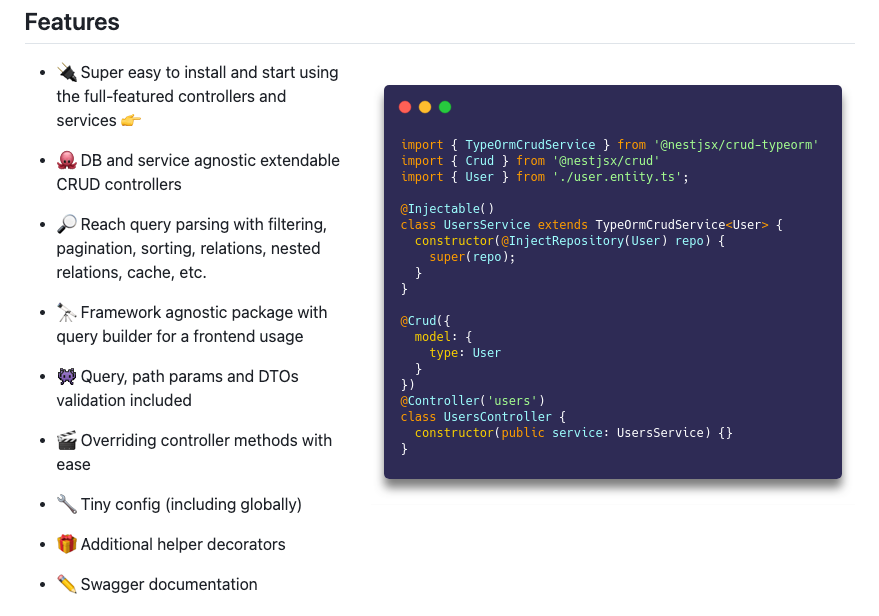
| GitHub | https://github.com/nestjsx/crud |
|---|---|
| GitHub Stars | 4.1k |
| Most Recent Update on GitHub | 1 years ago |
| Open Source License | MIT |
| Number of Active Contributors | 36 |
| Acceptance of External PRs | Yes |
| Official Website | / |
| Documentation | https://github.com/nestjsx/crud/wiki#why |
CRUD (Nestjsx) is a library based on the NestJS framework, designed specifically for creating RESTful APIs, offering a comprehensive set of CRUD functionalities. It enables developers to quickly generate standard CRUD operation interfaces, greatly simplifying the development process of RESTful APIs.
CRUD (Nestjsx) is designed to simplify the development process by providing a standardized approach to handle common data operations, allowing developers to focus more on implementing business logic.
Key Features
- Automated CRUD Generation: Uses simple decorators to automatically generate complete CRUD operations for data models, including create, read, update, and delete functionalities.
- Flexible Query Parsing: Supports complex query functions such as filtering, pagination, sorting, and handling relations and nested relationships.
- Service and Database Independence: Can be used with any database or service, providing highly extensible CRUD controllers.
- Rich Configuration Options: Supports global configuration and validation, providing additional helper decorators to simplify the development process.
Use Cases
- Enterprise-Level Applications: Suitable for scenarios requiring rapid development of enterprise backend services, especially projects needing strict adherence to RESTful standards.
- Rapid Prototyping: Quickly build prototypes, validate business logic, and accelerate development cycles.
💡 Read More: Exploring RAD: 5 Best Application Cases
PHP-CRUD-API (3.6k stars)
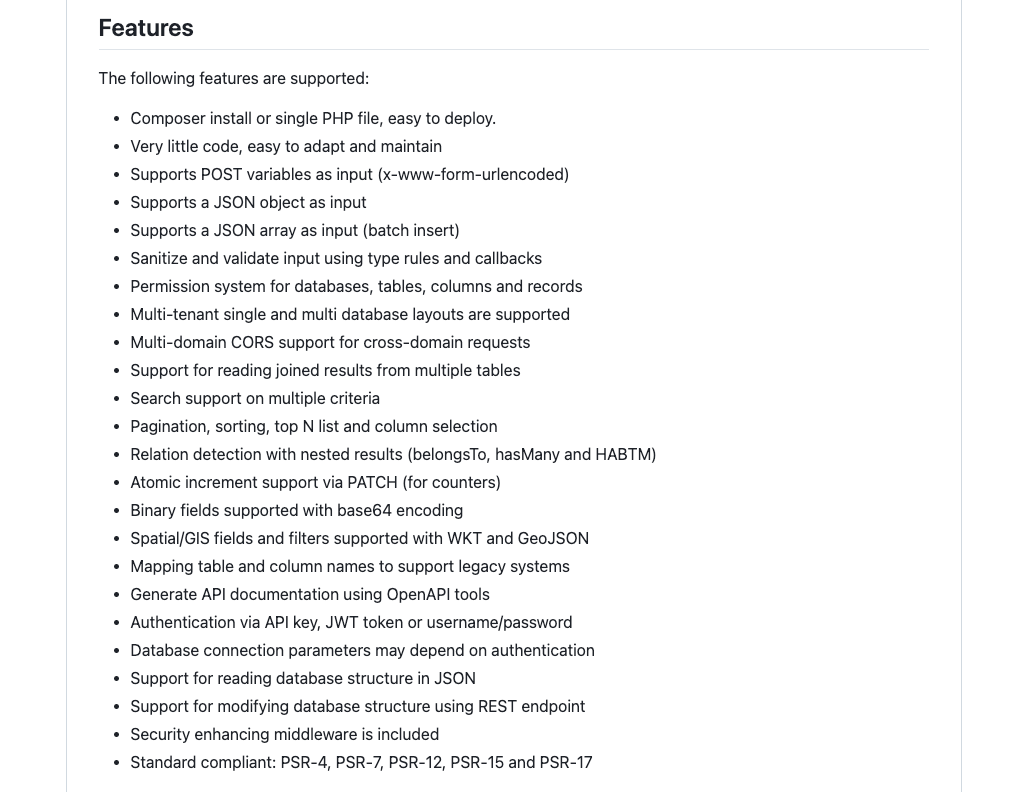
| GitHub | https://github.com/mevdschee/php-crud-api |
|---|---|
| GitHub Stars | 3.6k |
| Most Recent Update on GitHub | 1 year ago |
| Open Source License | MIT |
| Number of Active Contributors This Year | 40 |
| Acceptance of External PRs | Yes |
| Official Website | / |
| Documentation | / |
PHP-CRUD-API is a single-file PHP script that adds a complete REST API to SQL databases with simple configuration. It supports multiple database systems, including MySQL/MariaDB, PostgreSQL, SQL Server, and SQLite, making it an ideal choice for rapidly deploying APIs.
PHP-CRUD-API provides an efficient way to create and manage database-driven REST APIs without needing to write extensive backend code, making it a powerful tool for rapidly developing web applications.
Key Features
- Single File Deployment: The entire API runs through a single PHP file, with no complex installation or configuration required.
- Multi-Database Support: Compatible with various databases, connecting to different types of databases through simple configuration.
- Rich Functionality: Supports CRUD operations, automatic documentation generation (OpenAPI), complex queries, and data permission management.
- Extensibility: Supports middleware, custom controllers, and environment variable configurations, allowing for adjustment and extension of functionalities as needed.
Use Cases
- Rapid Prototyping: For developers needing to quickly validate data-driven applications, they can deploy and test APIs in a short period.
- Small Projects: Suitable for small or medium-sized projects needing a quick and straightforward backend solution.
Summary
If any of these CRUD projects meet your needs, further exploration and experimentation are recommended! Through practical application, you will better understand how they specifically optimize and simplify the development process.
- Appsmith and Refine are particularly suitable for quickly building internal tools and management panels with their rich components and flexible data management capabilities.
- APIJSON offers an almost code-free way to quickly develop and iterate APIs, ideal for startups and developers needing rapid concept validation.
- NocoBase provides robust backend support for complex enterprise applications with its data model-driven approach.
These tools cater to a variety of project needs, from small-scale projects to large enterprise applications, and, through their open-source nature, offer high customization and extensibility. Whether you’re looking for a solution for rapid deployment or a platform for deep customization, these CRUD projects are worth exploring further!
Related reading: